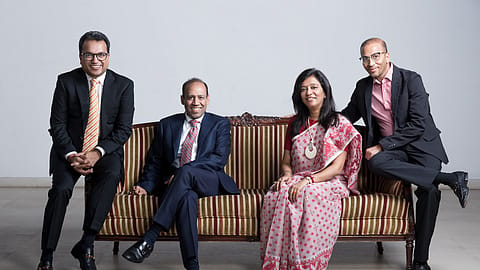Emami: It’s ‘payback’ time
The Kolkata-headquartered group is working on a strategy to repay debt raised for other businesses, while trying to bring down pledged promoter holdings in its FMCG company.

The promoters of the Emami Group are working on a two-pronged strategy: One, they are trying to bring down the debt raised to fund new businesses by selling a 10% stake in its flagship listed entity Emami Limited. And two, they are trying to bring down the percentage of pledged promoter holdings in their Kolkata-headquartered consumer goods firm.
At present, the level of promoter-pledged shares in Emami Ltd is 47.6%, which is “extremely high” according to analysts who say that the company is attempting to bring it down to 30-36% in the medium term.
Typically, promoters pledge shares to secure loans for working capital needs or to fund other businesses. It can be bothersome for companies as they need to maintain the value of the collateral (promoter shareholding) used to secure a loan, or else provide additional shares if the value erodes.
“Nearing 50% [of pledged shares] is not a comfortable level and the management would need to take necessary steps and they are already working on it. Typically anything beyond 25-30% of pledged shares leads to an unpleasant situation for a company,” Abneesh Roy, senior vice president, Edelweiss Securities, tells Fortune India.
Roy explains that unless it is an extreme situation, no promoter wants to sell part of their stake in the flagship business. Emami Ltd is the group’s “crown jewel”. “For the promoters to sell their [10%] stake in Emami Ltd was an extreme situation; however, it has helped them ward off any kind of negative impact on the listed entity. It was a proactive step taken by the promoters,” he adds.
A brokerage report from Macquarie Group concurs: Selling a stake in Emami Ltd was the right strategy adopted by the company to resolve the funding issues of other promoter businesses, it says, adding that a stake sale does not indicate lower confidence in the business.
Analysts point out that the Indian financial market is witnessing a “liquidity crisis”, citing the example of Zee Entertainment Enterprises Ltd., which went through “extreme turmoil” in January when Zee’s stock [Essel Group’s flagship media business] tanked 26% in a single day.
Recommended Stories
Recently, Subhash Chandra, chairman of Essel Group and Zee, had announced that Zee’s promoters are looking to sell half of their stake in the company to repay loans and ramp up global expansion. The analyst community had raised concerns over the Zee promoters’ high debt level. “If interest levels go up and liquidity dries up in the market then it becomes a problem for a company with a high percentage of pledged promoter holdings,” a market expert notes.
Emami Group, on the other hand, is taking steps to tackle the issues of high debt and pledged shares. Last month, the promoters announced the stake sale in Emami Ltd, to raise about `1,600 crore. The money will be used to repay debt in the group’s other businesses and ease the liquidity position of the promoters, the management had said.
Emami was founded in 1974 by Radhe Shyam Agarwal and his childhood friend, Radhe Shyam Goenka. Even today, it is run by their children. After the divestment, the families jointly own 62.74% (promoter holding) in Emami Ltd. “We are committed to maintaining our significant majority stake in the company and do not anticipate any further dilution of stake in the foreseeable future,” Mohan Goenka, director, Emami Ltd, noted in a statement.
Industry experts say that even after the stake sale, the promoter holding is very high. According to them, typically, in India companies have a promoter stake of 20- 25%; still, the promoters exercise good control over the entity.
(INR CR)
With a string of successful brands such as BoroPlus, Fair And Handsome, Navratna Oil and Zandu Balm, Emami Ltd has a market capitalisation of about ₹18,000 crore.
As Emami is exploring various fund-raising exercises to repay some of its loans and to meet working capital requirements, word on the Street is that the FMCG major is in talks to raise funds from global investment firm KKR. The amount is reported to be about ₹2,000 crore.
A source aware of the deal tells Fortune India that talks are on, but nothing has been signed yet. “For now it seems likely to be a structured deal with a combination of both equity and debt,” the source says.
Besides raising private equity funding, Emami is also looking to sell its non-core businesses such as hospital chain AMRI Hospitals and pharmacy-retail brand Frank Ross. Bengaluru-based billionaire entrepreneur Ranjan Pai-led Manipal Health is reportedly in talks with AMRI. The chain has three super speciality hospitals and a day-care centre in Kolkata and a hospital in Bhubaneswar.
Edelweiss’ Roy points out that the funding from KKR is an access to long-term debt and during that period Emami can look at an IPO for its cement business (Emami Cement) or sell non-core assets such as the hospital business, pharmacies, and its real estate venture.
Last October, Emami Cement had filed a draft red herring prospectus with markets regulator SEBI (Securities and Exchange Board of India) for an IPO. The plan was to raise ₹1,000 crore to repay some of the cement company’s debts. But the IPO got delayed due to unfavourable market conditions.
Industry experts say the Emami Cement IPO is still several months away.
This story was originally published in the April 2019 issue of the magazine.